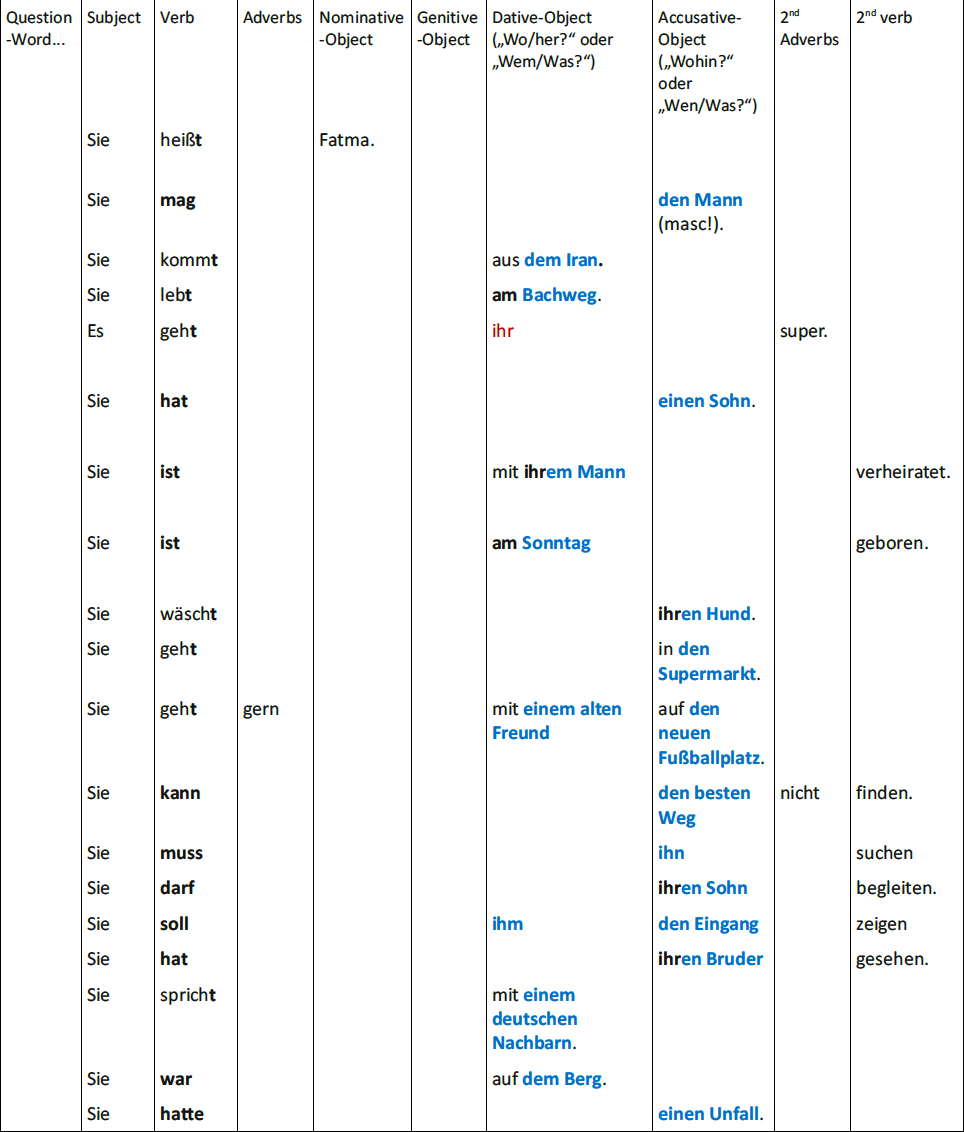


 You are going to Learn:
You are going to Learn:  Common phrases,
Common phrases,  how to express facts with masculine nouns and pronouns,
how to express facts with masculine nouns and pronouns,  the third person singular,
the third person singular,  a lot of new vocabulary and
a lot of new vocabulary and  much more.
much more.
Fatma “likes the masculine gender”. This simply means that this chapter focusses on
Don´t mind, if you do not exactly UNDERSTAND this concept! I guess that even a lot of German natives and perhaps also teachers don´t! :) Nevertheless, if you are willing to study these sentences by heart, you are going to internalize and recognize important phrases and structures in a very natural way.
So, let us find out more about our third person feminine, about Fatma:
“Sie” (= the third person singular “she”):
Question-Word… |
Subject |
Verb |
Adverbs |
Nominative-Object |
Genitive-Object |
Dative-Object („Wo/her?“ oder „Wem/Was?“) |
Accusative-Object („Wohin?“ oder „Wen/Was?“) |
2nd Adverbs |
2nd verb |
|
Sie |
heißt |
|
Fatma. |
|
|
|
|
|
|
Sie |
mag |
|
|
|
|
den Mann (masc!). |
|
|
|
Sie |
kommt |
|
|
|
aus dem Iran. |
|
|
|
|
Sie |
lebt |
|
|
|
am Bachweg. |
|
|
|
|
Es |
geht |
|
|
|
ihr |
|
super. |
|
|
Sie |
hat |
|
|
|
|
einen Sohn. |
|
|
|
Sie |
ist |
|
|
|
mit ihrem Mann |
|
|
verheiratet. |
|
Sie |
ist |
|
|
|
am Sonntag |
|
|
geboren. |
|
Sie |
wäscht |
|
|
|
|
ihren Hund. |
|
|
|
Sie |
geht |
|
|
|
|
in den Supermarkt. |
|
|
|
Sie |
geht |
gern |
|
|
mit einem alten Freund |
auf den neuen Fußballplatz. |
|
|
|
Sie |
kann |
|
|
|
|
den besten Weg |
nicht |
finden. |
|
Sie |
muss |
|
|
|
|
ihn |
|
suchen |
|
Sie |
darf |
|
|
|
|
ihren Sohn |
|
begleiten. |
|
Sie |
soll |
|
|
|
ihm |
den Eingang |
|
zeigen |
|
Sie |
hat |
|
|
|
|
ihren Bruder |
|
gesehen. |
|
Sie |
spricht |
|
|
|
mit einem deutschen Nachbarn. |
|
|
|
|
Sie |
war |
|
|
|
auf dem Berg. |
|
|
|
|
Sie |
hatte |
|
|
|
|
einen Unfall. |
|
|

Translations of the sentences above:
Her name is Fatma.
She likes the man (masc!).
She comes from Iran.
She lives in the Bachweg.
She is feeling super!
She has a son.
She is married to her husband.
She was born on Sunday.
She washes her dog.
She goes to the supermarket.
She likes going to the soccer pitch with an old male friend.
She cannot find the best way.
She must look for it.
She may accompany her son.
She shall show him the entrance.
She has seen her brother.
She speaks with a (male) German neighbor.
She was on the mountain.
She had an accident.